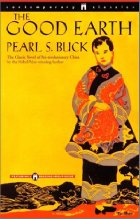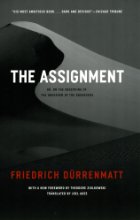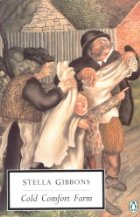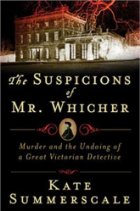1. Name the last book by a female author that you've read.
I finished Pearl S. Buck's The Good Earth just a few days ago, and Stella Gibbons's Cold Comfort Farm about a week before that.
2. Name the last book by an African or African-American author that you've read.
At the beginning of the year I read The First Man, by Algerian Albert Camus. If we're talking African-Americans, I heartily enjoyed Toni Morrison's Song of Solomon last summer, and Zora Neale Hurston's Their Eyes Were Watching God is probably among my top twenty novels of all time.
3. Name one from a Latino/a author.
I don't know if the Caribbean counts as "Latin," but I read Edwidge Danticat's Breath, Eyes, Memory about a year ago. Before that, I might have to go back to Gabriel Garcia Marquez's One Hundred Years of Solitude, which I read a few years ago.
4. How about one from an Asian country or Asian-American?
A few months ago I read Haruki Murakami's After Dark. And the aforementioned The Good Earth was written in and about China by a white American missionary woman.
5. What about a GLBT writer?
Ah, "GLBT." Always a tricky acronym. I read Willa Cather's Death Comes for the Archbishop a few months ago, but Cather would have argued strenuously against being labeled a lesbian even though most of her relationships were with women. I've read almost everything Virginia Woolf wrote, but the same is probably true of her. Ditto for Hans Christian Andersen, whose fairy tales I read at the end of last year. It's been a while since I've read a book whose author would willingly join this category; I might have to go back to my last re-reading of Leslie Feinberg's Stone Butch Blues a few years ago. Possibly I've re-read The Importance of Being Earnest more recently, but I don't remember.
6. Why not name an Israeli/Arab/Turk/Persian writer, if you're feeling lucky?
I'm sure Marjane Satrapi's Persepolis and Persepolis 2 are the ones everyone's naming, but I'll hop on the bandwagon.
7. Any other "marginalized" authors you've read lately?
Marginalization is an interesting concept, and almost infinitely expandable and contractable. I'm listening to James Joyce's Ulysses right now, in which Irish marginalization under English rule features heavily (also Irish persecution of the Jews, although Joyce was not himself Jewish). Similar dynamics exist vis-a-vis England and Australia in the novels of Peter Carey, about which I'm totally nuts. On the other hand, aboriginal people might argue against the idea that poor white Australians are/were marginalized.
A few months ago David and I listened to John Elder Robinson's memoir Look me in the Eye: My Life with Asberger's, which is about autism-spectrum disorders and the way in which those who suffer from them are disadvantaged and misunderstood. Mental illness (or just difference) is often less visible than gender or skin color, but it definitely creates barriers for those affected.
I like the subtlety in books like Arundhati Roy's The God of Small Things and Salman Rushdie's Shalimar the Clown, which address how the same people can be both the oppressed (say, the Indians by the British) and the oppressor (the lower-cast Indians by the upper-caste Indians; the Kashmiris by the Indians and Pakistanis). Then a novel like A Fine Balance, by Rohinton Mistry, seems much less concerned about marginalization of Indian people from without, and much more concerned about class struggle within the country. Mistry is also a member of a religious minority, although I wouldn't have known that without looking him up on Wikipedia. And judging from his canceled 2002 tour of the US, he personally has more often been marginalized for looking like a Muslim than for actually being a Zoroastrian.
I think being conscious of the diversity of one's reading is really valuable, and I also think that trying to dissect these issues is much more complicated than sorting authors into neat categories of race, gender, religion and sexuality. Is an author "representative" of lesbianism if none of her books mention it? Does it make a difference to the last question if she embraced or denied her own sexuality? What if her books do deal with it, but she's not known to have had a lesbian relationship? Or if she had a long, caring lesbian partnership, but writes about homosexuality in a negative way? What if an author is most interested in writing about class oppression, but finds himself most oppressed in his personal life on account of his perceived ethnicity or religion?
I've read some brilliant novels dealing with a type of oppression not directly or personally experienced by the author, and often wonder where those fall - Haruki Murakami, for example, often writes compassionately and intelligently about oppression of women, even though he is a man, but only obliquely does he refer to Western oppression of Asian countries, despite being Japanese. My first instinct, in thinking about The Good Earth, is to assume it "doesn't count" because, although written in and about China, it's by a white American...and yet, Pearl S. Buck, in her own life among the Chinese, probably felt like even more of a minority than many Asian-Americans do in the modern US. How do we define our terms: are we aiming to read novels by people who belong(ed) to groups currently marginalized by our own culture, whether or not they've written about it, or are we aiming to read books about the experience of marginalization, whether or not the group is currently marginalized? Or, do we merely want to read a wide variety of novels, by all kinds of people on all kinds of subjects, and observing the race/class/gender of the authors we're reading is helpful in that? I don't have the answers, but these are, I think, interesting points to consider.






